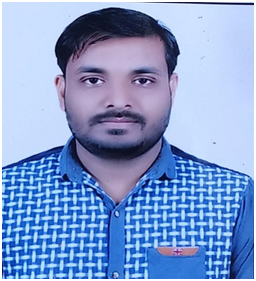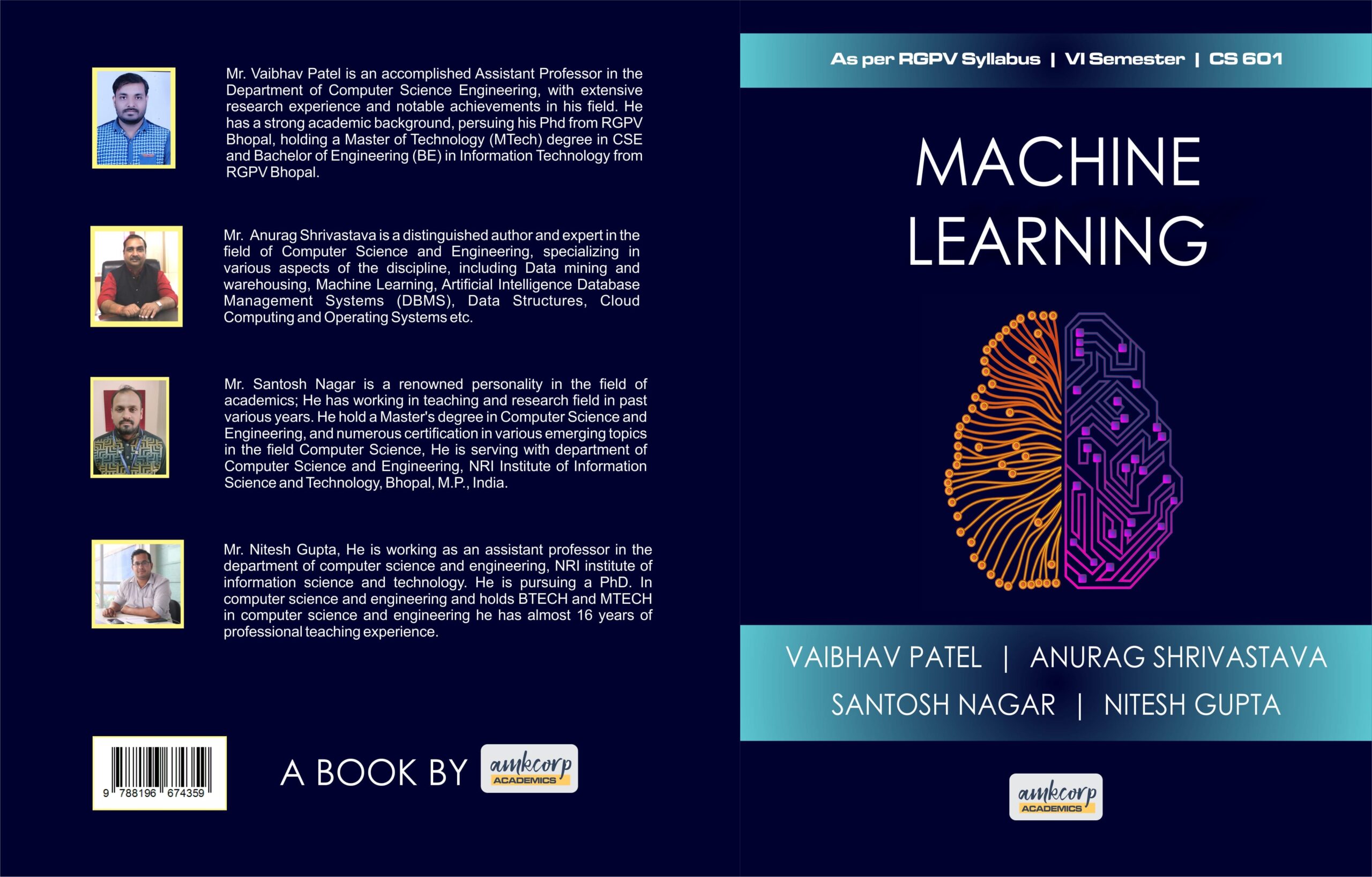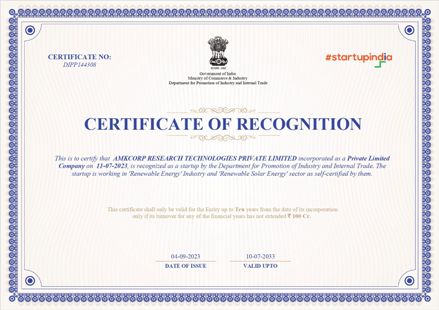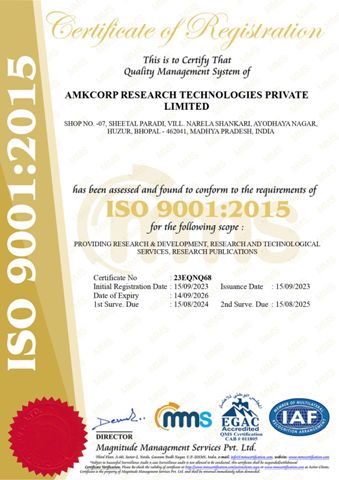
MACHINE LEARNING
AUTHOR(S) -
VAIBHAV PATEL, ANURAG SHRIVASTAVA, SANTOSH NAGAR, NITESH GUPTA
DOI – 10.61909/isbn.978-81-966743-8-0.AMKEDTB122304
Genre/Subject – MACHINE LEARNING [CS-601]
Scope – RGPV Syllabus
Book code – AMKEDTB122304 pgs: 180
ISBN(P) – 978-81-966743-5-9
ISBN(E) – 978-81-966743-8-0
Published – 10-12-2023
AUTHOR(S)

VAIBHAV PATEL
Vaibhav Patel is an accomplished Assistant Professor in the Department of Computer Science Engineering, with extensive research experience and notable achievements in his field. He has a strong academic background, persuing his Phd from RGPV Bhopal, holding a Master of Technology (MTech) degree in CSE and Bachelor of Engineering (BE) in Information Technology from RGPV Bhopal.
Vaibhav Patel has a diverse range of experience in the field of education, training and research. He served as an Assistant Professor at NRI Institute of Information Science and Technology (NIIST) Bhopal. His roles include teaching undergraduate and post graduate courses and active involvement in various educational activities. He also serves as the Institute Innovation Coordinator of the Institution’s Innovation Council (IIC) Startup, emphasizing his dedication to fostering innovation and entrepreneurship additionally. Vaibhav Patel worked as a research fellow in National Institute of Technical Teacher’s Training and Research Bhopal on research “Impact of Accreditation on Performance of student and Faculty.”
With a passion for research, He has published numerous research papers in prestigious national and international journals. His research interests include data mining, machine learning, natural language processing, IoT, and Artificial Intelligence showcasing a dynamic and inquisitive approach to exploring emerging technologies and knowledge advancement. His academic achievements are complemented by his active participation in professional organizations. He is working as Subject Matter Expert and associated with various organizations. He is a member of ACM Chapter, Asia Society of Researchers (ASR). He is actively participates in Seminars, Workshops, and Faculty Development Programs (FDPs), reflecting his commitment to continuous learning and professional growth.

ANURAG SHRIVASTAVA
Prof. Anurag Shrivastava is a distinguished author and expert in the field of Computer Science and Engineering, specializing in various aspects of the discipline, including Data mining and warehousing, Machine Learning, Artificial Intelligence Database Management Systems (DBMS), Data Structures, Cloud Computing and Operating Systems etc. With a passion for research and education, he has made significant contributions to the advancement of technology and has inspired countless students and professionals in the field of Computer Science and Engineering, Information Technology and Mathematics. Prof. Shrivastava holds three post graduate degrees M.Tech. MCA and M.Sc. Mathematics from a prestigious institution of India, where he conducted groundbreaking research in the field of data mining and database management systems. His research area are Machine Learning, Data Mining, Artificial Intelligence, Expert System, Soft Computing, Cloud Computing, Numerical Integration and Computer Networks. He had attended numerous seminar, national and International conferences, webinars and faculty development programs.
Prof. A. Shrivastava has a long and illustrious academic career. He is currently a tenured associate professor at a leading engineering college, where he serves as the head of the Computer Science and engineering department, Coordinator, Internal Quality Assurance Cell, Vice president of Institute Innovation Council in NRI Institute of Information Science and Technology. He had more than 22 years of rich experience in academics. He is known for his engaging teaching style and has mentored numerous graduate and post graduate students of various institutes, many of whom have gone on to make notable contributions to the field.
Anurag Shrivastava has authored of numerous research papers and a book on Database management system. He is working as subject matter expert as a freelancer and associated with various organization. He is a professional members of Association for Computing Machinery (ACM) and also a member of Asia Society of Researchers (ASR).

SANTOSH NAGAR
Prof. Santosh Nagar is a renowned personality in the field of academics; He has working in teaching and research field in past various years. He hold a Master’s degree in Computer Science and Engineering, and numerous certification in various emerging topics in the field Computer Science, He is serving with department of Computer Science and Engineering, NRI Institute of Information Science and Technology, Bhopal, M.P., India. Prof. Nagar is associated with various researcher groups and societies likewise, Association for Computing Machinery and Asia Society of Researcher. His areas of expertise are Machine Learning, Soft Computing, Artificial Intelligence, Computer Networks, Embedded System and many more.
Prof S. Nagar has published numerous research papers in prestigious national and international journals seminars and conferences. His passion for and dedication to computer science and engineering continue to be the driving forces in his career development. He is working as a member of internal quality assurance cell and the member of Institute Innovation Council and member of various reviews committees. He is an excellent motivator, teacher, evaluator and a researcher.

NITESH GUPTA
Nitesh Gupta, He is working as an assistant professor in the department of computer science and engineering, NRI institute of information science and technology. He is pursuing a PhD. In computer science and engineering and holds BTECH and MTECH in computer science and engineering he has almost 16 years of professional teaching experience. He has around 10 research papers published in reputed international journals and organized and presented research papers in two international conferences. His research interests focus on image processing, security analytics, and network security. He has worked extensively in the intersection of databases and artificial intelligence.
ABOUT BOOK / ABSTRACT
With a background steeped in the sciences of probability, statistics, and linear algebra, I embarked on a journey to unveil the nuanced world of machine learning. This book serves as a comprehensive guide, systematically navigating through fundamental concepts like regression, convex optimization, and data preprocessing before delving into the heart of machine learning models and supervised/unsupervised learning paradigms.
Unit-II explores the dynamic interplay between linearity and non-linearity, introducing readers to activation functions, weights and bias, gradient descent, and the intricacies of neural network architectures. It addresses challenges like the unstable gradient problem and presents advanced topics such as autoencoders, batch normalization, and hyperparameter tuning.
Unit-III and Unit-IV delve into the sophisticated realms of Convolutional Neural Networks (CNNs) and Recurrent Neural Networks (RNNs), unraveling the mysteries of image and sequence processing. From inception networks to transfer learning, and from long short-term memory to reinforcement learning, this journey spans the entire spectrum of contemporary machine learning.
Unit-V extends the exploration to Support Vector Machines, Bayesian learning, and real-world applications in computer vision, speech processing, and natural language processing. The book culminates in a compelling case study of the ImageNet Competition, providing a tangible application of the principles discussed.
This book is more than just a compilation of chapters; it’s a roadmap crafted with the intent to empower enthusiasts and professionals alike. Whether you’re a newcomer seeking an introduction to machine learning or an expert aiming to refine your skills, this book invites you to embark on a journey through the layers of algorithms and models that define the cutting edge of artificial intelligence.
Thank you for joining me in this exploration of Machine Learning. May the insights gained from these pages inspire curiosity and foster a deeper understanding of the captivating world of intelligent systems.
EDITOR(S)
Mr. PAVAN NUTALAPATI
Mr. Pavan Nutalapati is a Project Lead at Oracle, where he leverages his expertise in Distributed Systems, Cybersecurity, Cloud architecture, and Disaster Management primarily within the fintech and public sector. With over 15 years of experience, Pavan plays a pivotal role in developing and implementing secure and scalable cloud solutions for financial technology applications.
At Oracle, Pavan focuses on designing and Developing robust security frameworks that protect sensitive financial data and ensure compliance with industry regulations. His work includes the implementation of encryption protocols, secure access controls, and continuous monitoring systems that have reduced security breaches by 35% in the past year. Additionally, Pavan has been instrumental in optimizing cloud infrastructure, leading initiatives that have increased system efficiency by 40% while reducing operational costs by 25%.
Dr. MANISH AGRAWAL
Dr. Manish Agrawal (Ph.D., CSE, RGPV, India) serves as an Assistant Professor in the Computer Science and Engineering Department at Technocrats Institute of Technology (Excellence), Bhopal, MP. A respected figure in academia, Dr. Agrawal is dedicated to cultivating a vibrant learning environment for students. Beyond his teaching role, he is the visionary founder of pyqonline.com, India’s largest web portal for old question papers, revolutionizing exam preparation. Driven by a passion for advancing knowledge, his research interests in Computer Science and Engineering contribute to both the academic community and the broader technological landscape. Dr. Agrawal’s multifaceted contributions underscore his commitment to student growth and the continual evolution of education.
REFERENCES
- Amodei, D., Olah, C., Steinhardt, J., Christiano, P., Schulman, J., and Mané, D. (2016). Concrete Problems in AI Safety. Manuscript. https://arxiv.org/abs/2303.03378.
- Bubeck, S., Chandrasekaran, V., Eldan, R., Gehrke, J., Horvitz, E., Kamar, E., Lee, P., Lee Y. T., Li, Y., Lundberg, S., Nori, H., Palangi, H., Ribeiro, M. T., and Zhang, Y. (2023). Sparks of Artificial General Intelligence: Early Experiments With GPT-4. Manuscript.
- Chen, L., Lu, K., Rajeswaran, A., Lee, K., Grover, A., Laskin, M., Abbeel, P., Srinivas, A., and Mordatch, I. (2021). Decision Transformer: Reinforcement Learning Via Sequence Modeling. NeurIPS 2021.
- Christiano, P. F., Leike, J., Brown, T. B., Martic, M., Legg, S., & Amodei, D. (2017). Deep Reinforcement Learning from Human Preferences. NeurIPS 2017.
- Priya Ahirwar et.al. “Fake News Detection Using Machine learning Technique : A Review.” International Research Journal of Engineering & Applied Sciences (IRJEAS). 11(4), pp. 01-07, 2023. https://doi.org/10.55083/irjeas.2023.v11i04001.
- Langosco, L., Koch, J., Sharkey, L., Pfau, J., and Krueger, D. (2022). Goal Misgeneralization in Deep Reinforcement Learning. Proceedings of the 39th International Conference on Machine Learning, 12004-12019.
- Poonam Parihar et.al. “A Review on Age and Gender Recognition using Deep learning Techniques.” International Research Journal of Engineering & Applied Sciences (IRJEAS). 11(4), pp. 08-12, 2023. https://doi.org/10.55083/irjeas.2023.v11i04002.
- Krakovna, V., Uesato, J., Mikulik, V., Rahtz, M., Everitt, T., Kumar, R., Kenton, Z., Leike, J., and Legg, S. (2020). Specification Gaming: The Flip Side of AI Ingenuity. Blog Post. https://www.deepmind.com/blog/specification-gaming-the-flip-side-of-ai-ingenuity.
- Langosco, L., Koch, J., Sharkey, L., Pfau, J., and Krueger, D. (2022). Goal Misgeneralization in Deep Reinforcement Learning. Proceedings of the 39th International Conference on Machine Learning, 12004-12019.
- Swasti Goyal, Tanya Sharma, Anuj Kumar. A Review on Breast Cancer Prediction Using Machine Learning. International Research Journal of Engineering & Applied Sciences (IRJEAS). 10(4), pp. 01-07, 2022. https://doi.org/10.55083/irjeas.2022.v10i04001.
- Manish Kumar Sharma et.al. Machine Learning Based Customer Churn Prediction Using Improved Feature Selection Techniques. International Research Journal of Engineering & Applied Sciences (IRJEAS). 11(4), pp. 26-36, 2023. https://doi.org/10.55083/irjeas.2023.v11i04005.
- Doshi-Velez, F., Kortz, M., Budish, R., Bavitz, C., Gershman, S., O’Brien, D., Scott, K., Schieber, S., Waldo, J., Weinberger, D., Weller, A., and Wood, A. (2017). Accountability of AI under the Law: The Role of Explanation. Manuscript. https://arxiv.org/abs/1711.01134.
- Ankit Pandey. A Detailed Perspective on Artificial Blood. International Research Journal of Engineering & Applied Sciences (IRJEAS). 11(3), pp. 27-32, 2023. https://doi.org/10.55083/irjeas.2023.v11i03008.
- Glanois, C., Weng, P., Zimmer, M., Li, D., Yang, T., Hao, J., & Liu, W. (2022). A Survey on Interpretable Reinforcement Learning. Manuscript. https://arxiv.org/abs/2112.13112.
- Satish Kumar Yadav, Santosh Kumar. Fault Diagosis of CHB Inverter Using Machine Learning. International Research Journal of Engineering & Applied Sciences (IRJEAS). 10(4), pp. 24-29, 2022. https://doi.org/10.55083/irjeas.2022.v10i04007.
- Hubinger, E., van Merwijk, C., Mikulik, V., Skalse, J., and Garrabrant, S. (2021). Risks from Learned Optimization in Advanced Machine Learning Systems. Manuscript. https://arxiv.org/pdf/1906.01820.pdf.
- Krakovna, V., Uesato, J., Mikulik, V., Rahtz, M., Everitt, T., Kumar, R., Kenton, Z., Leike, J., and Legg, S. (2020). Specification Gaming: The Flip Side of AI Ingenuity. Blog Post. https://www.deepmind.com/blog/specification-gaming-the-flip-side-of-ai-ingenuity.
- Metz, C. (2016). In Two Moves, AlphaGo and Lee Sedol Redefined the Future. Wired 16 March, 2016. https://www.wired.com/2016/03/two-moves-alphago-lee-sedol-redefined-future/.
- Abhishek Dixit, Santosh Kumar. Machine Learning Based Efficient Protection Scheme for AC Microgrid. International Research Journal of Engineering & Applied Sciences (IRJEAS). 10(4), pp. 18-23, 2022. https://doi.org/10.55083/irjeas.2022.v10i04009.
- Ouyang, L., Wu, J., Jiang, X., Almeida, D., Wainwright, C., Mishkin, P., Zhang, C., Agarwal, S., Slama, K., Ray, A., Schulman, J., Hilton, J., Kelton, F., Miller, L., Simens, M., Askell, A., Welinder, P., Christiano, P. F., Leike, J. & Lowe, R. (2022). Training Language Models to Follow Instructions with Human Feedback. NeurIPS 2022.
- Priya Parameswarappa. Live Memory Forensic for Windows. International Research Journal of Engineering & Applied Sciences (IRJEAS). 10(4), pp. 08-17, 2022. https://doi.org/10.55083/irjeas.2022.v10i04002.
- Popov, I., Heess, N., Lillicrap, T., Hafner, R., Barth-Maron, G., Vecerik, M., Lampe, T., Tassa, Y., Erez, T., and Riedmiller, M. (2017). Data-Efficient Deep Reinforcement Learning for Dexterous Manipulation. Manuscript. https://arxiv.org/abs/1704.03073.
- Reed, S., Zolna, K., Parisotto, E., Colmenarejo, S. G., Novikov, A., Barth-Maron, G., Gimenez, M., Sulsky, Y., Kay, J., Springenberg, J. T., Eccles, T., Bruce, J., Razavi, A., Edwards, A., Heess, N., Chen, Y., Hadsell, R., Vinyals, O., Bordbar, M., and de Freitas, N. (2022). A Generalist Agent. Manuscript. https://arxiv.org/abs/2205.06175.
- Shah, R., Varma, V., Kumar, R., Phuong, M., Krakovna, V., Uesato, J., & Kenton, Z. (2022). Goal Misgeneralization: Why Correct Specifications Aren’t Enough for Correct Goals. Manuscript. https://arxiv.org/abs/2210.01790.
- Turpin, M., Michael, J., Perez, E., & Bowman, S. R. (2023). Language Models Don’t Always Say What They Think: Unfaithful Explanations in Chain-of-Thought Prompting. Manuscript. https://arxiv.org/abs/2305.04388.
- Wang, G., Xie, Y., Jiang, Y., Mandlekar, A., Xiao, C., Zhu, Y., Fan, L., and Anandkumar, A. (2023). VOYAGER: An Open-Ended Embodied Agent with Large Language Models. Manuscript. https://arxiv.org/abs/2305.16291.









